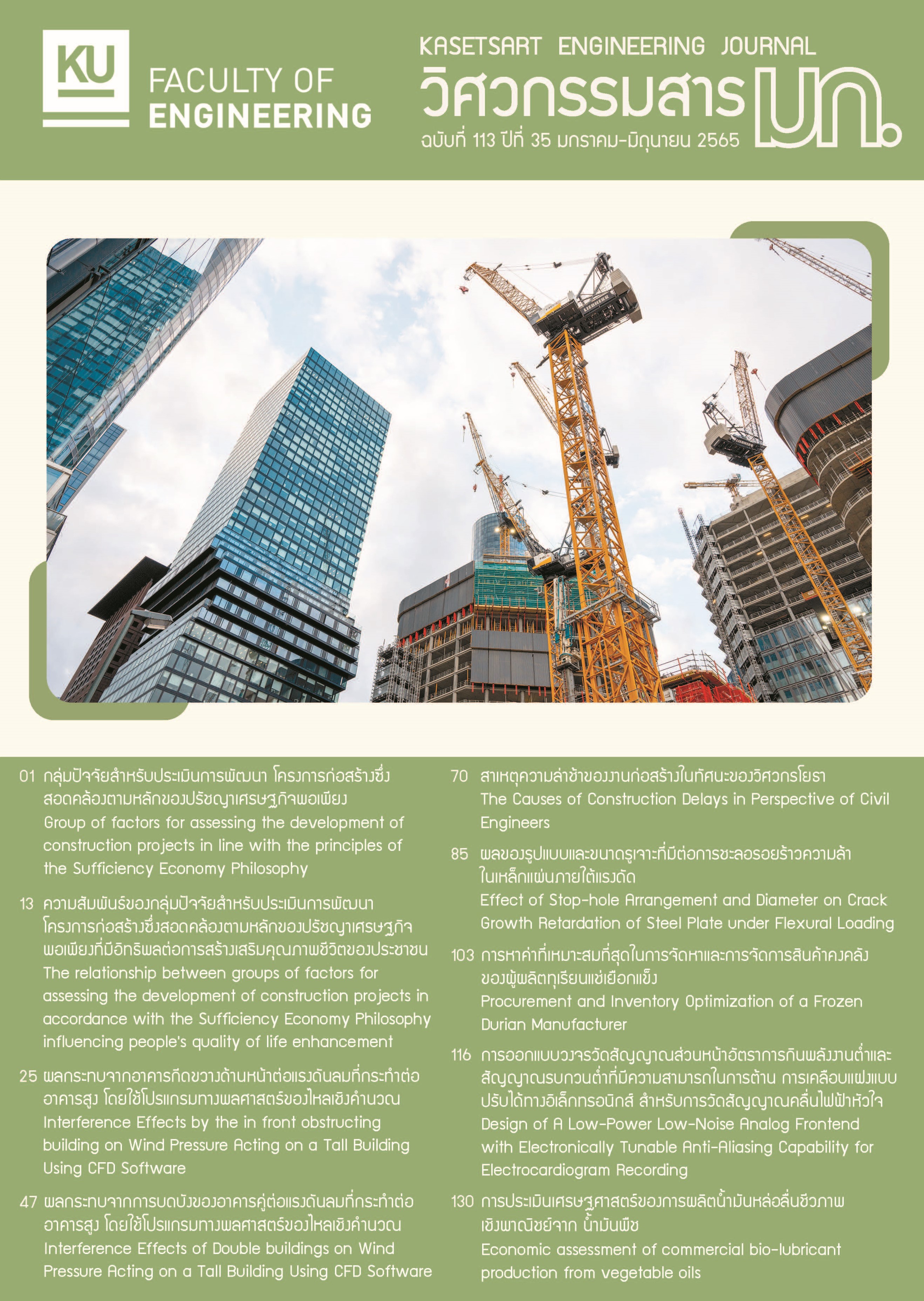Group of factors for assessing the development of construction projects in line with the principles of the Sufficiency Economy Philosophy
Keywords:
sufficiency economy philosophy, construction project development, budget allocation, Factor AnalysisAbstract
Construction Projects contribute significantly to the development of people's lives. If sufficiency economy philosophy can be used to assess the construction project during development stage, allocation of budget can be more efficient. The study aims to factor analyzed construction project development indicators in accordance with the sufficiency economy philosophy. Data was collected through interview with questionnaire with 138 engineers in Thai construction industry. The results revealed that the 38 initial indicators were divided into 7 groups: Group 1 Accurate problem identification focusing on the underprivileged group with 7 factors, Group 2 Securing economy necessity for the underprivileged group with 10 factors, Group 3 Sincere mitigation of development impact with 4 factors, Group 4 Maximize utilities through comprehensive consideration with 6 factors, Group 5 Extended value of development to a sustainable community with 4 factors, Group 6 Systematically alternatives develop with comprehensive knowledge with 4 factors, and Group 7 Strong teamwork and team spirit with 3 factors. The total variance explained is 61.860%. The respondents emphasized most on Sincere mitigation of development impact (4.23). However, they do not give importance as much on Securing economy necessity for the underprivileged group (3.65) and Extended value of development to a sustainable community (3.23) especially on solving underprivileged group’s problems of making a living (3.23) and also developing the project knowledge for local people to understand and further extend the project benefits (2.75).
References
Chantama N, Wethyavivorn P (2021). Sufficiency economy indicators for built environment projects development in Thailand, Proceeding of the 59th KU Annual Conference, Bangkok, Thailand, 43-P457 ISBN: 978-616-278-617-4.
Fei W, Opoku A, Agyekum K, Oppon J, Ahmed V, Chen C, and Lok K (2021). The Critical Role of the Construction Industry in Achieving the Sustainable Development Goals (SDGs): Delivering Projects for the Common Good by Sustainability 2021, 13(16), 9112; https://doi.o g/10.3390/su13169112r
Goubran S (2019). On the Role of Construction in Achieving the SDGs. Journal of Sustainability Research. J Sustain Res.2019;1: e190020; https://doi.org/10.20900/jsr20190020
Khaemmani T (2015). Deciphering the philosophy of sufficiency economy to teach thinking processes: Chulalongkorn University Press.
Lincharearn A (2555). Qualitative Data Analysis Techniques. Journal of Educational Measurement, Faculty of Education, Naresuan University, 17(1), July 2012, 17-29.
Macmillan T (1971). The Delphi Technique. Paper Presented at the annual meeting of the California Junior Colleges Associations Committee on Research and Development.
Marome W (2017). A KNOWLEDGE ASSESSMENT ON SUSTAINABLE CITIES IN THAILAND; Sustainable City. Nakhon Pathom: Industrial Ecology Research and Training Center Faculty of Environment and Mahidol University Resource Center. P 144. ISBN 978-616-443-033-4.
Mundfrom D, Shaw D, and Ke T (2009). Minimum Sample Size Recommendations for Conducting Factor Analyses. International Journal of Testing, Volume 5, 2005 - Issue 2 P159-168. https://doi.org/10.1207/s15327574ijt0502_4
NESDB (2019). NESDB ECONOMIC REPORT (pp. 1-32) https://www.nesdc.go.th/ewt_dl_link.php?nid=8429
Oladinrin T, Ogunsemi D, and Aje I (2012). Role of construction sector in economic growth: Empirical evidence from Nigeria. Journal of the Environment, ISSN: 1597-8826.
ORDPB (2011). Sufficiency Economy Contests 2nd round. Bangkok: Office of the Royal Development Projects Board.
Osei V (2013). The Construction Industry and its Linkages to the Ghanaian Economy-Polices Improve the Sector’s Performance. International Journal of Development and Economic Sustainability, 56-72
Rummel R (1970). Applied Factor Analysis. Evanston: Northwestern University Press 1970, 73-78327 SBN 8101-0254-4, Printed in the United States of America.
Thailand, U. N. (2558). Sustainable Development Goals (SDGs). https://www.un.or.th/globalgoals/th/the-goals/.
Thorne S (2008). Data analysis in qualitative research. http://dx.doi.org/10.1136/ebn.3.3.68
Yudelson J (2010). Sustainable Retail Development: New Success Strategies.
Downloads
Published
Issue
Section
License

This work is licensed under a Creative Commons Attribution-NonCommercial-NoDerivatives 4.0 International License.


